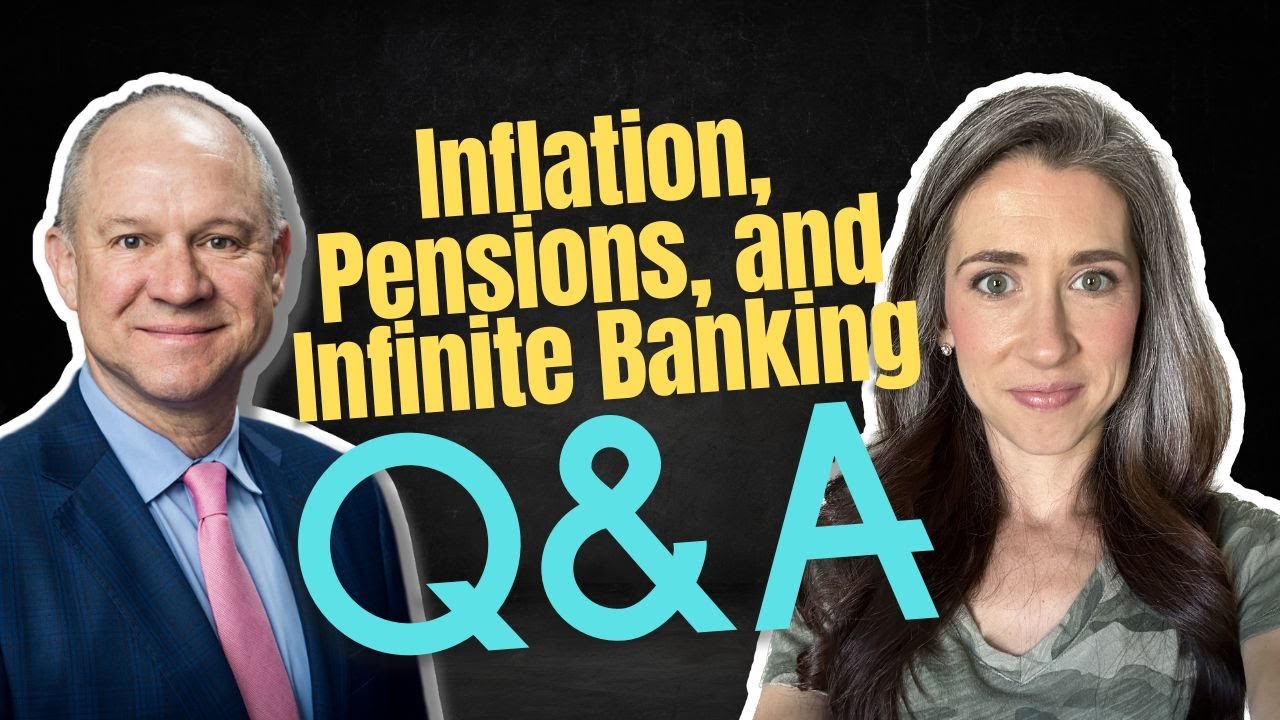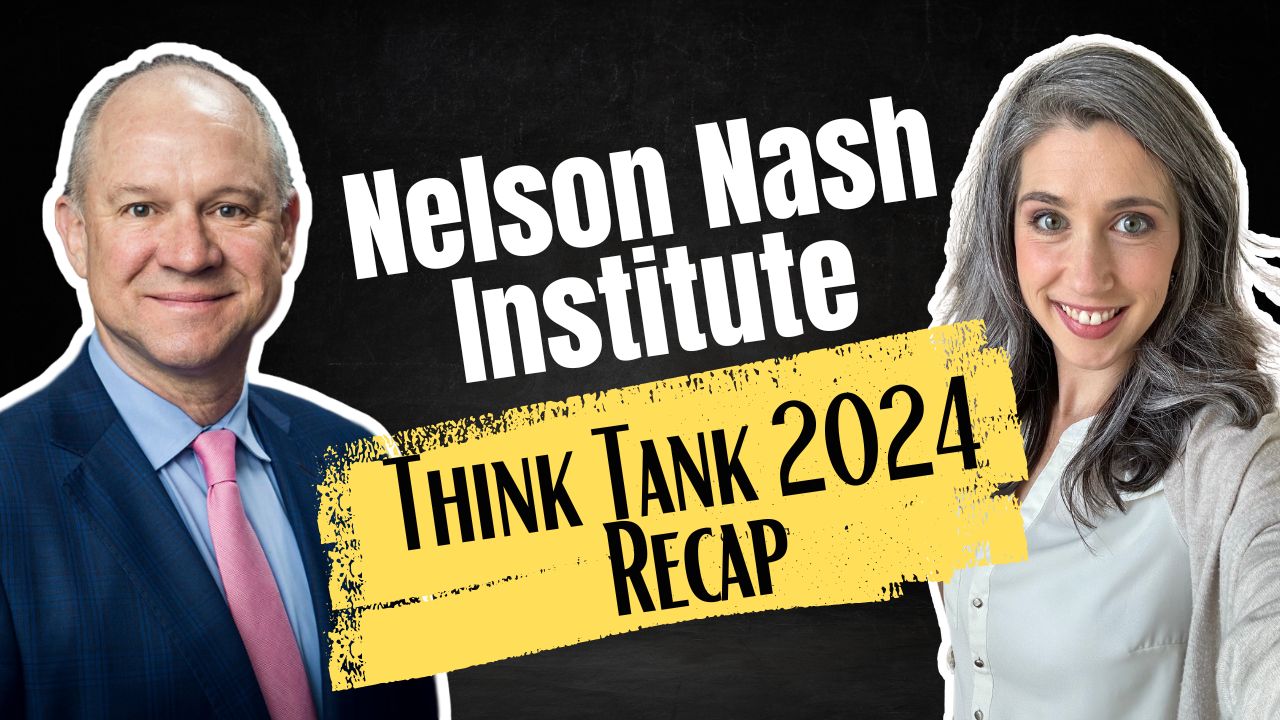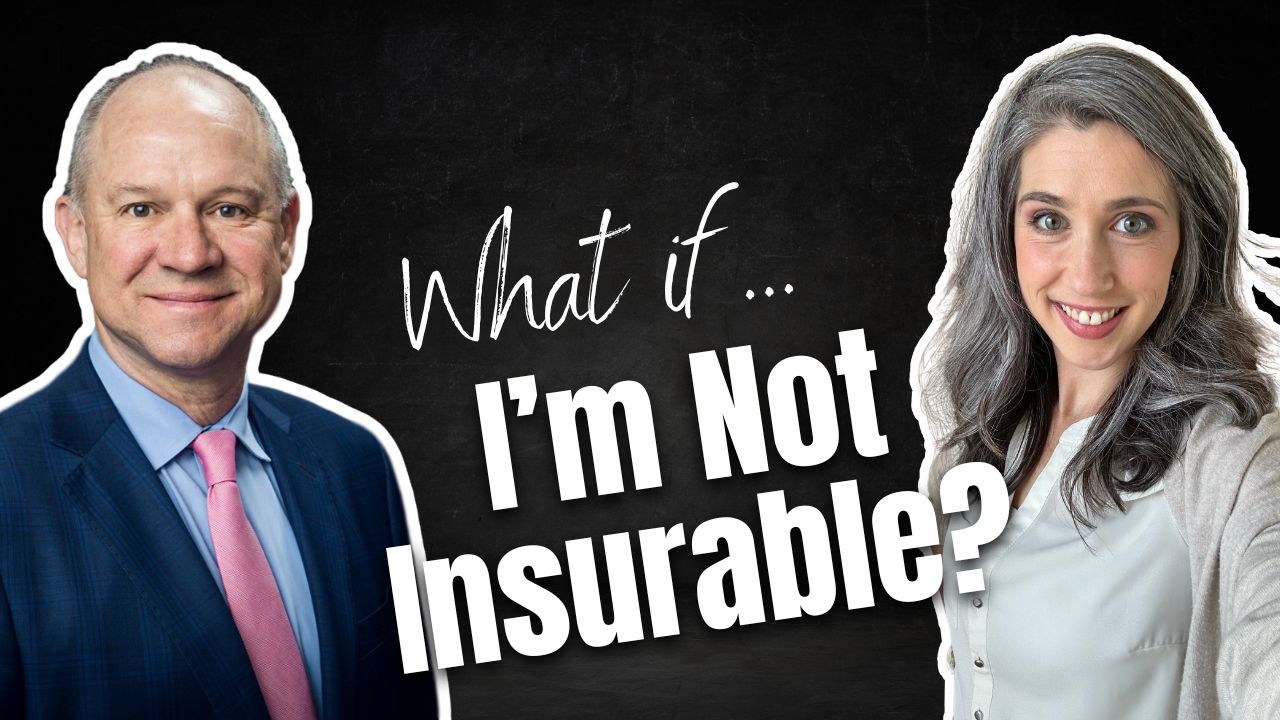
Inflation, Pensions, and Infinite Banking Q&A
Considering Infinite Banking, got questions? We love your questions because we know that gaining clarity and getting answers frees you up to make decisions about your financial life. And chances are if you’re asking, someone else is too! Today, we’re tackling audience questions on inflation, pensions, and infinite banking.
To get more clarity on common questions we get from our tribe, tune in now!
Podcast: Play in new window | Download (Duration: 1:29:19 — 102.2MB)
Subscribe: Apple Podcasts | Spotify | Android | Pandora | RSS | More
Table of contents
How do you weather the current economy?
This is a good time to be in a position of cash and wait for the right opportunity. This means raising your standards and only choosing high-caliber deals that align with your values. This is also a good time to innovate in your field.
How Do You Weather the Current Economy?
To be more specific, this listener asked how they can navigate the current economy and also create passive income within a year. Is this possible?
Getting capital within a year may be difficult because the Fed is tightening up on capital. This is part of the reason we’re looking at a recession now. Remember that “opportunity seeks liquidity,” as Nelson Nash would say. Don’t feel like you need to deploy capital right now. Since the cost of capital is increasing, you want to wait for the right deal, not just any deal. It’s good to be smart and hang onto your capital until you find something that meets all your standards.
This is also a good time to network and connect with other professionals that you can learn from. Be sure you’re connecting with high-caliber people that have good advice that aligns with your values.
You can also look at your current career path or income stream and seek ways to increase that revenue now. That doesn’t necessarily mean investing. It can also mean expanding your offerings, pivoting to fit the market, and improving your services. A recession is a long game, so you need to think about the bigger picture as you navigate this time. Short-term decision-making won’t serve you in this economic climate.
How Do You Track Borrowed Funds?
Whether you have a large portfolio of policies or just one policy, you might have some loans you want to track. Staying organized can help you with your due diligence, however, don’t get too bogged down with the minute details.
One way you can keep track of things is by opening a separate bank account. When you take a loan, put the money into that one account, separate from your other money. Then pay for the investment or whatever you’re doing from the new account. Then send the cash flow from the investment back into that checking account. You can then use this as the fund with which to pay back the policy loan. This way, everything is organized, yet you don’t have to get into the weeds to track it all.
If you’re really picky about it, you can have multiple accounts, one for every loan or investment. Whatever you do, make sure it works for you and makes things easier, not harder.
What Are the MEC Guidelines on Single Premium Life Insurance?
This viewer asked about the guidelines for Modified Endowment Contracts (MECs), and whether there is some benefit for churches or non-profit organizations.
A MEC policy is a policy that has been overfunded in the early years and loses its designation as life insurance. This is an IRS guideline to prevent people from laundering money or using life insurance as a tax shelter. When a policy becomes a MEC, it loses tax advantages and other benefits.
MEC guideline interpretations differ from company to company because they have different company structures and different growth projections. However, they will send notifications if you are going to MEC your policy so that you can rectify it if you wish.
Single Premium life insurance is when you fully pay up your life insurance in one year. The challenge is that if you take a large loan after a single premium policy, the interest cost may not be covered by the interest and dividend growth. This happens because the growth on the base premium is less than the growth on the paid-up additions, and a single premium is mostly PUA. This could mean that you run into a loss of tax advantages.
Think Long-Term
Rather than aiming for perfection right now, don’t be afraid to just get started, even if it’s small. If you use a single premium policy, you could run into trouble with taxes and interest costs. You might want to put everything you can into a policy right away, but you don’t have to. It’s often better to take small steps. Figure out what’s sustainable for you (or your church or non-profit).
You don’t have to do a long schedule of premiums, either. You could contribute over ten years, for example. This allows you to feed a large lump sum into the policy for a relatively short amount of time. This can put you in a safer position.
Are IBC Policies Inflation-Proof?
This question depends a bit on what facet of the policy you’re looking at. For example, if the costs of goods are going up, then there’s a lot of power in a level premium. Over time, that premium will feel less and less simply because it’s not increasing alongside everything else. And yet, your account is still increasing with interest and dividends.
If you consider the cash value, it might not always be “inflation-proof.” This is going to depend on the rate of inflation compared to the growth rate of the policy. However, you also have to factor in the risk. A life insurance policy is virtually risk free because it can’t decrease. So while the growth rate might be a steady 4-5%, it’s safe and stable. The stock market may have an average of 12%, but if any losses occur, it can take years to recover. Tack inflation on top of that and it’s not looking so good.
How Do You Maximize Your Pension Plan?
One of our viewers has a pension plan that didn’t pan out the way he had hoped it would. He expresses regret for what he wishes he had done but wants to do the best with what he has regardless. His question to us is, how can he do the best with what he has?
[39:25] “What’s interesting is, if our listeners think that they don’t have a lot of knowledge about how money works, people that pensions really don’t, because they don’t have to. Because they know when they retire there’s just going to be an income stream coming in. It’s an annuity.”
These kinds of hyper-specific questions are hard to answer in a public format, however, there is some general wisdom we can impart. What’s interesting here is that if you started a life insurance policy now, you know that at some point, a benefit will pay to your spouse or other heirs. There’s some certainty there, and you won’t disinherit your heirs.
Paying into a life insurance policy may also enable you to create some hybrid income strategies that you wouldn’t otherwise have.
When Can You Borrow from Your Policy?
This is a common misconception that you borrow money FROM your life insurance policy. In reality, you’re borrowing AGAINST your policy. This distinction is critical because it indicates where the money is coming from, and to who you’re paying interest. When you take a loan, the life insurance company is your lender. They lend you the money because your cash value acts as collateral, and they know the loan will get paid back. Then, you pay interest to the life insurance company as you repay the loan.
This means that during the entire term of the loan, your cash value is untouched. That way, the money can earn interest and dividends uninterrupted. You can’t actually borrow money from your policy, you can only withdraw it. Once you do, there’s no way to put it back. So taking a loan from the insurance company is advantageous.
To answer the original question, you can take a policy loan from day one of your policy. You won’t have much cash value to leverage at that point. However, it is available. Sometimes new policy owners like to take a small loan in the beginning and pay it back immediately, just to prove to themselves that it’s possible.
Why Do You Lose Control When You Pay Back Your Mortgage?
It’s a common misconception that the closer you are to paying off your mortgage, the better off you are. This, unfortunately, is not true. The reason is that the banks are incredibly strict about loans and leverage. And if you’re only a few years away from paying off your mortgage, and lose your job, the banks will not be lenient. The first question they’ll ask if you want to access your equity is “where do you work?” If you’re unemployed, you won’t even make it to the application.
And because you’re close to paying off your home, it’s easy for the banks to foreclose on your house and still make a profit. On the other hand, if you are at the start of your loan, banks don’t want to foreclose on your home. Otherwise, they’ll be at a loss. So they’re more lenient and willing to work with you on solutions because they want the most bang for their buck.
Do the Cash Value and Death Benefit Both Get Paid at Death?
Unfortunately, this is a topic that frequently gets miscommunicated to clients. This can be detrimental to common knowledge and understanding of cash value and death benefit. So, to be as clear as possible, you do not get both values upon death. So if your death benefit is $1 million, and your cash value at the time is $500k, your beneficiary does not receive $1.5 million. They will only receive the $1 million
The cash value represents the portion of your death benefit that you can use while you are living. As you pay premiums, you’ll get more “equity” in your policy. The policy is designed in such a way that by the time the policy endows, you’ll have full access to the death benefit, and it is therefore paid to you if you’re alive.
When you throw PUAs into the mix, you’re purchasing small, fully paid insurance policies. When you do this, your death benefit increases, AND your cash value increases. Yet your cash value still won’t equal the death benefit until the endowment.
Because the cash value is the equity of your death benefit, you don’t receive both upon death. You only receive the death benefit. The cash value is simply the amount of death benefit you can leverage while you’re alive.
Does Infinite Banking Work Internationally?
We get this question all the time, and we’re so honored to have an amazing international audience. The listener who asked is from the UK and expresses that there’s no information about infinite banking.
On our show, when we talk about the Infinite Banking Concept, we are referring specifically to products that are available in the United States. There are comparable life insurance policies in Canada, and we have friends who implement infinite banking there. However, to our understanding, there are no products like this in other countries. This does not mean you can’t use an infinite banking strategy.
Generally, to do infinite banking in the US with a US policy, you need to be in the US at the time of the policy application and delivery. You do not have to be a US citizen, however, you must have hard assets within the US. Hard assets include real estate or a business with a physical address in the US.
Do I Have to Take a Policy Loan if I Have Other Options?
This is a fantastic question from a listener. If you can get a better interest rate outside of your life insurance policy, can you take it?
The reason infinite banking is so powerful is that it provides you with options. You don’t have to take a policy loan if you can get a better rate elsewhere! In fact, you should always seek the best possible option.
However, you want to consider more than the interest rate when choosing a source of capital. You also want to be crystal clear on the loan repayment terms. For example, you may get a better rate at the bank, however, you have much more control with the life insurance company. If you’re taking a risk with your investment, you may actually want the flexibility of the policy loan.
You are not locked into any one choice. Your IBC policy simply gives you more options.
Book A Strategy Call
Do you want to coordinate your finances so that everything works together to improve your life today, accelerate time and money freedom, and leave the greatest legacy? We can help! Book an Introductory Call with our team today https://themoneyadvantage.com/calendar/, and find out how Privatized Banking, alternative investments, or cash flow strategies can help you accomplish your goals better and faster. That being said, if you want to find out more about how Privatized Banking gives you the most safety, liquidity, and growth… plus boosts your investment returns, and guarantees a legacy, go to https://privatizedbankingsecrets.com/freeguide to learn more.
Nelson Nash’s Legacy: Think Tank 2024 Recap
Embark on a transformative financial odyssey with us as we reflect on our profound experiences at the Nelson Nash Think Tank for 2024. Unlock the doors to personal economic empowerment with the Infinite Banking Concept (IBC), a brainchild of the late Nelson Nash that revolutionizes the use of dividend-paying whole life insurance. We shed light…
Read MoreBecoming Your Own Banker, Part 25: Uninsurability Hacks
Do you want to use Infinite Banking, but you’re uninsurable? Today we are discussing uninsurability hacks! Don’t worry, uninsurability ISN’T a game-stopper for using Infinite Banking to build your own banking system. That means you can still reap the exponential reward of dividends and interest that grow with uninterrupted compounding, store liquid cash reserves that…
Read More


